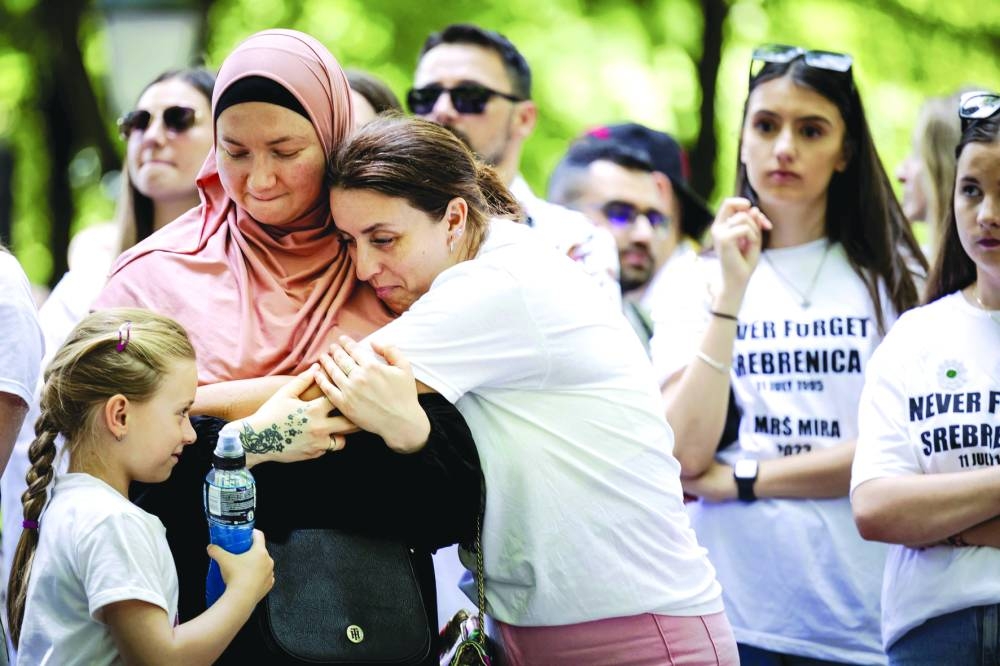The remains of 30 victims of the Srebrenica massacre in Bosnia were laid to rest yesterday, as thousands commemorated the atrocity’s 28th anniversary against a backdrop of surging tension, with the landmark peace deal that ended the war under pressure.
Bosnian Serb forces captured the ill-fated eastern town — then a UN-protected enclave — on July 11, 1995 and in the following days summarily killed some 8,000 Muslim men and boys, in an act labelled as a genocide by two international courts.
The remains of most of the victims were later found in mass graves in eastern Bosnia, where the perpetrators moved them from original burial sites to cover up the crime.
Many of the 30 victims buried yesterday were identified in previous years, but the families chose to wait until more of their remains were recovered.
“Now we know where his bones are... we know where we will go to pray,” said former Srebrenica resident Nedzad Mehinovic, whose father Idriz’s remains were among those buried yesterday.
In the massacre, Mehinovic also lost his grandfather, uncles, nephews, and many other close relatives, he told AFP.
The anniversary came as a political tug of war in recent weeks has seen some of the biggest cracks emerge in Bosnia since the end of the brutal 1992-1995 civil war with the signing of a US-brokered peace deal.
A day ahead of the ceremony, the top international envoy to Bosnia Christian Schmidt — tasked with overseeing the civilian aspects of the Dayton accords that ended the war — pledged to “ensure that legal steps are taken against all those who deny the genocide”.
The comment appeared to be a thinly disguised swipe at his chief rival in the country, Bosnian Serb President Milorad Dodik, who has repeatedly refused to call the atrocity a genocide.
Dodik and Schmidt are locked in an increasingly high-stakes showdown after the Bosnian Serb leader signed legislation last week that targets the authority of the envoy and the constitutional court in Bosnia’s Serb entity.
The laws have been widely condemned by Western powers, with Washington accusing Dodik of flouting the Dayton agreement.
Dodik’s signing of the laws last week came just days after Schmidt tried to head off the controversial moves by passing an executive order that deems the legislation illegal and prevents their implementation.
The peace accords hammered out at a US airbase in Dayton, Ohio in 1995 followed a Nato-backed bombing campaign targeting Bosnian Serb positions that helped bring the country’s warring parties to the negotiating table.
The Nato intervention was in part triggered by the massacre in Srebrenica along with other vicious attacks targeting civilians by Bosnian Serb forces.
Following the brutal war that claimed some 100,000 lives, Bosnia has been divided along ethnic lines. One half of the country belongs to the Serb entity while the other is ruled by a Muslim-Croat federation.
A UN court sentenced both Bosnian Serb wartime political leader Radovan Karadzic and his army chief Ratko Mladic, to life in prison, notably for Srebrenica.
Political leaders of Serbs living in Bosnia today and in neighbouring Serbia refuse to accept that a genocide took place at Srebrenica, preferring to call it a “major crime”.

Participants attend a ceremony in The Hague yesterday to commemorate the 28th anniversary of the Srebrenica massacre in Bosnia. (AFP)
